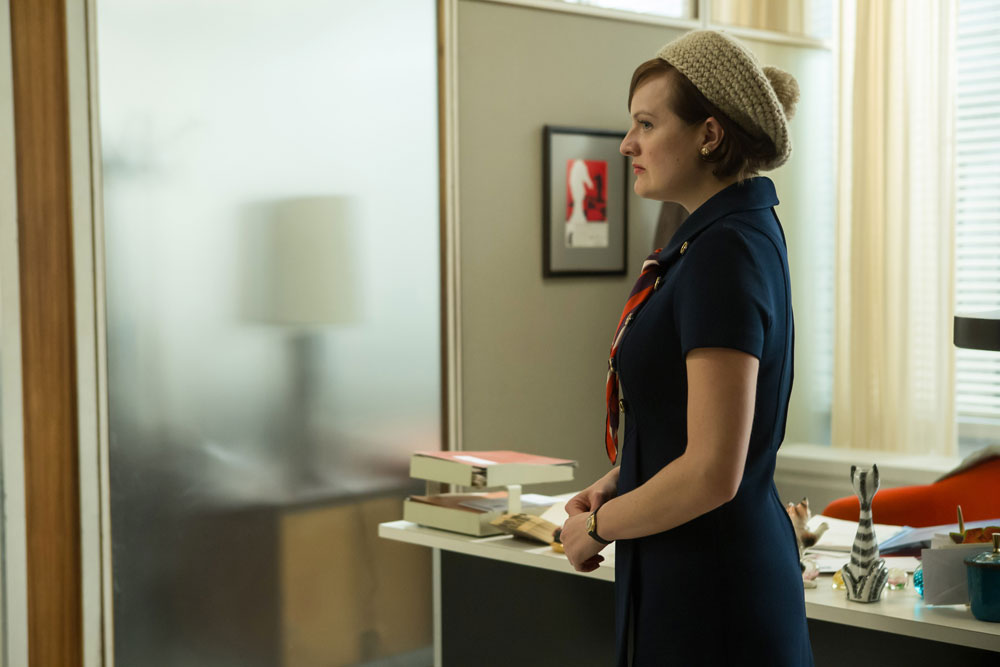Elisabeth Moss in AMC’s Mad Men
“Do you have time to improve your life?” asks Don Draper (via Accutone pitch, through Freddie Rumsen).
“Haven’t you ever dreamed of a place where there was peace and security, where living was not a struggle but a lasting delight?” asks the Lost Horizon title card on Don’s gigantic new TV.
You’d think, with bookending questions like that, this episode would be somewhat uplifiting or optimistic. Instead, it was one of the most depressing episodes the show’s ever had – and that’s REALLY saying something. It was certainly the most depressing season opener they’ve ever done. The show tends toward more optimistic, place-setting season openers that say “Here’s the new status quo, and aren’t you glad to see everyone again?” This one was more along the lines of “Nothing’s changed. Everyone’s miserable.” Literally everyone. Not one character was happy or in a good place in this world – and in some cases, it was truly painful to watch. Actually, that’s not true. There was one happy person. And his happiness was the most ironic fate of them all.
Not that we’re complaining about the depressing parts. On the contrary; this is pretty much where the show needs to be as it kicks off the beginning of the end of the story. Everyone’s dealing with the consequences of various choices or circumstances. And almost everyone is stuck or hurting in some way because of it. On our book tour last week, while giving an answer to a question about Mad Men, we said something that seemed to initially take our audience aback. “Mad Men is a show about how we never really get over our own shit.” Of course, people might have been taken aback because we were sitting right in front of the children’s section when we blurted this into the microphone. “Instead,” we continued, “The best any of us can do is learn to accept our shit and work within the boundaries of our own paradigms.” Sure it’s a bit New Age-y, which we’ll chalk up to jet lag, but that, to us, has always been the main theme of the show. “People can’t get over their own shit.” People don’t change. At best, they just learn to accept themselves. Don and Peggy have always exemplified these ideas. He can’t change and she can’t either (she will always be the person in the room observing the other people in the room rather than engaging them directly; always at a remove from others), but she blossomed when she came to terms with who she is.
(Edited to add: Mo Ryan, who was at the signing where we answered this question, after having treated us to a fabulous dinner, wound up mentioning this exchange in her review. We had no idea our vulgar little outburst was going to get such traction.)
But she’s not exactly at the top of her game now. Having been lifted up and then punished by two male mentors, she’s now stuck with a boss who has absolutely no regard or use for her whatsoever. She’s so powerless and unappreciated that the old humiliations and gaslighting techniques of Don and Ted would seem almost preferable in comparison. At least it showed they cared about her, in some sick way. Lou couldn’t care less about Peggy. “I guess I’m just immune to your charms.” Having spent the better part of the last decade relentlessly pursuing a career over a personal life, she’s now utterly alone and powerless, literally sinking to the floor in tears in her shitty (but someday outrageously expensive) Upper West Side brownstone. Don is gone, Ted is gone, Abe is gone. Whether it’s true or not, in that moment of despair, she’s got nothing in her life. Nothing at all.
Joan is also paying a heavy price on the professional front, although it’s less a result of her choices and more a result of the times she lives in. Having landed the Avon account for the agency, she essentially gets promoted to a full accounts position and handed the problematic Butler Footwear account by a distressingly overworked Ken. Unfortunately, at every turn, she’s gets treated like she’s brain damaged by every man she encounters. In some ways, Joan has it harder than Peggy does as a career woman because most men find her attractive and assume that’s all she’s got going on. But by the time she started her little crash MBA course, she’d had about enough of that shit. “You’re going to need another pad,” she tells the condescending professor. And when the guy from Butler pretty much ignores her request, she finally brings the full weight of her Joan powers down on his head. Because if there’s one talent Joan freaking Holloway Harris has learned and perfected in the last sixteen years, it’s how to cut an obnoxious man down to size. Granted, she ended the episode mostly on an up note, it’s still obvious she’s never going to get the kind of respect she deserves as a partner of this company. Ken yells at her like she’s a secretary. And what’s sad about that is Joan would never have allowed him to yell at her like that when she actually was a secretary. Her moment of strength on the phone with the Butler guy was wonderful to see, but we’re struck by how timid she is now in comparison to the old days. Power has actually made her more vulnerable, ironically.
And it’s REALLY depressing to see Ken, with what looks like a permanent eye injury from those crazed Chevy execs of last season, screaming and yelling, and just generally pitching a Pete Campbell-like fit. This from the guy who never let the job get to him and devoted his real energy to writing science fiction stories.
And then there’s Roger, whose hilarious romps through the counterculture have taken a seedier, darker turn. He’s another one who has no ties anymore. His wife is gone; his daughter is gone, his second wife is gone and his mother is gone. He doesn’t even have the guy who was the closest thing to a best friend Roger could abide: Don himself. No one seems to care about Roger, not even Roger himself. And as for Margaret, we’re a little early on the timeline for est, but she’s clearly on some sort of consciousness-raising schtick. Roger being out of breath at the restaurant felt like some ominous foreshadowing. We never did find his hedonism all that believable, considering he had two heart attacks years ago.
And speaking of ominous foreshadowing, here’s Megan, discussing the coyotes which sound like they’re right outside her door but aren’t :”It’s just what happens to the sound in the canyons.”
And here’s the opening lines from the first chapter of Helter Skelter, the book about the Manson Family murders, including Sharon Tate’s:
“It was so quiet, one of the killers would later say, you could almost hear the sound of ice rattling in cocktail shakers in the homes way down the canyon.
The canyons above Hollywood and Beverly hills play tricks with sounds. A noise clearly audible a mile away may be indistinguishable at a few hundred feet.”
God, we almost hated pointing that out. We still maintain, as we did in the face of all that Tate hysteria of last season, that Weiner’s not that literal in his foreshadowing, but even we were shocked at how clearly he’s making a direct reference here to her murder.
Meanwhile, Don and Megan’s marriage now consists of some of the most tense, least romantic scenes ever seen on the show. And again, that’s REALLY saying something. Everything about their interactions seem prickly and awkward. And Don as much as admits, when he engages in that odd little Emotional Mile High Club tête-à-tête with Neve Campbell, that he thinks the marriage is pretty much over and he screwed it up again. His wife is gone, his job is gone, his family is gone. He’s left literally out in the cold in every aspect of his life; shivering and scared on a balcony. Utterly alone, all his demons having destroyed him, all his fears having come true. Just about the only reasons to be optimistic at all about him are the fact that his Accutron pitch was pretty much flawless; the best pitch we’ve heard from Don in years. And Neve Campbell’s character almost seemed like a parody of the bored, middle-aged sexy women who spew deep statements and philosophical musings at him before offering him sex. If Don has a type, that’s it. And he rejected her outright this time, choosing instead to literally turn away from her and open a window. Does it mean anything? We’ll see. They can’t spend the entire rest of the story showing him in the depths of despair, can they?
After all, isn’t that what the two questions quoted at the top of this review are asking? Is there time enough left for these people to improve their lives? Will life ever stop being such a struggle for them? That would seem to be the theme of the story this season. Can these people be happy? Can they learn to accept their own shit and move on in their lives? Or is it nothing but despair for them all?
But one person in this story is not wallowing in despair. One person seems to be, against all odds and reason, pretty happy and content where he is – and could serve as the way out of darkness for some of the other characters. The least likely of them all to be in such a state: Pete Campbell of all people; in Los Angeles of all places. After watching him pout and stomp his feet for almost a decade of story time, it’s almost hard to take this happy, contented, generous person who seems to be doing well in his life. We think it’s highly notable that he seems to be the only person at SC&P who stays in touch with Don and thinks his exile should end. We imagine that when Pete, who’s kept Dick Whitman’s secret for almost a decade now, heard the other partners recount the story of Don’s Hershey pitch crackup last year, he reacted with a bemused “Grew up in a whore house, you say! A thing like that!”
(More to come on Wednesday, in our Mad Style post for this episode.)
[Photo Credit: Jordin Althaus/AMC]
RuPaul’s Drag Race: Stupid Girls Next Post:
Jennifer Lopez in Zuhair Murad at the 2014 GLAAD Awards
Please review our Community Guidelines before posting a comment. Thank you!




